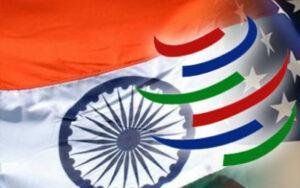
Why in News?
- The Cairns Group recently asserted that there is substantial government subsidy for India’s public stockholding (PSH) scheme.
- They contend that food security in other nations is compromised and global food prices are distorted by India’s farm support.
- India is under more pressure as a result to abide with WTO rules pertaining to farm subsidies.
What are the rules set forth by the WTO concerning agriculture subsidies?
- Objective:
- The goal of the WTO’s farm subsidies regulations is to prevent trade distortion on a worldwide scale and to maintain fair competition among farmers.
- The kinds and amounts of subsidies that member nations may offer to their agricultural industries are restricted by these regulations.
- Levels of subsidies:
- Amber Box:
- Amber box subsidies are those that have the potential to distort international trade by making a country’s products cheaper compared to those of other countries.
- Examples include subsidies for inputs like fertilizers, seeds, electricity, irrigation, and Minimum Support Prices (MSPs).
- The WTO categorizes agriculture’s amber box as all domestic support measures that are likely to distort production and trade.
- As per the trade agreement, signatories are required to commit to reducing trade-distorting domestic supports falling into the amber box.
- Members who haven’t made these commitments must keep their amber box support within 5-10% of their production value, following the De Minimis Clause:
- 10% for developing countries
- 5% for developed countries.
- Amber Box:
- Blue Box:
- The blue box consists of subsidies categorized as “amber box with conditions,” which are designed to reduce distortion.
- Support that would typically be classified under the amber box is placed in the blue box if it requires farmers to limit production.
- These subsidies aim to limit production by imposing production quotas or requiring farmers to set aside part of their land.
- Currently, there are no spending limits on blue box subsidies.
- Green Box:
- Green Box subsidies refer to domestic support measures that either do not cause trade distortion or cause minimal distortion at most.
- These subsidies are government-funded without providing price support to crops.
- They also include environmental protection and regional development programs.
- “Green box” subsidies are therefore allowed without limits, except in certain circumstances.
Cairns group
- About: The Cairns Group is a coalition of agricultural exporting countries advocating for agricultural trade liberalization.
- Established: It was established in 1986 and is named after Cairns, Australia, its founding location.
- Member Countries: The group consists of 19 member countries, primarily from the Asia-Pacific region and Latin America, including Australia, Canada, Brazil, and Thailand, among others.
- Objective: The Cairns Group aims to promote fair and open agricultural trade by advocating for the reduction of trade barriers, subsidies, and protectionist measures that distort global agricultural markets.
What is the World Trade Organization?
- About WTO:
- The World Trade Organization is an international organization regulating and promoting global trade.
- Established in 1995, it boasts 164 member countries, including the European Union.
- WTO provides a platform for member nations to negotiate and enforce trade agreements, resolve disputes, and foster economic growth and development.
- Its headquarters are located in Geneva, Switzerland.
- Origin of WTO:
- WTO evolved from the General Agreement on Tariffs and Trade (GATT), formed in 1947.
- The Uruguay Round (1986-94) of GATT led to the establishment of the WTO.
- WTO commenced operations on January 1, 1995.
- The Marrakesh Agreement, signifying the establishment of WTO, was signed in Marrakesh, Morocco, in 1994.
- India was among the founding members of the 1947 GATT and continued as a founding member of its successor, the WTO
People also ask
Q1: What effects does the World Trade Organization have on farmers in India?
Ans: India benefited from increased agricultural prices globally as a result of lower trade barriers and local agricultural substitution, which increased export revenue.
Q2: What is the farm subsidies The World Trade Organization agreement?
Ans: Reducing the agricultural support and subsidies that nations provide to their domestic farmers is the main goal of the Agreement on Agriculture (AoA), a World Trade Organization pact. This is one of the WTO’s most controversial accords.
Your article helped me a lot, is there any more related content? Thanks!
Your point of view caught my eye and was very interesting. Thanks. I have a question for you.
I don’t think the title of your article matches the content lol. Just kidding, mainly because I had some doubts after reading the article.